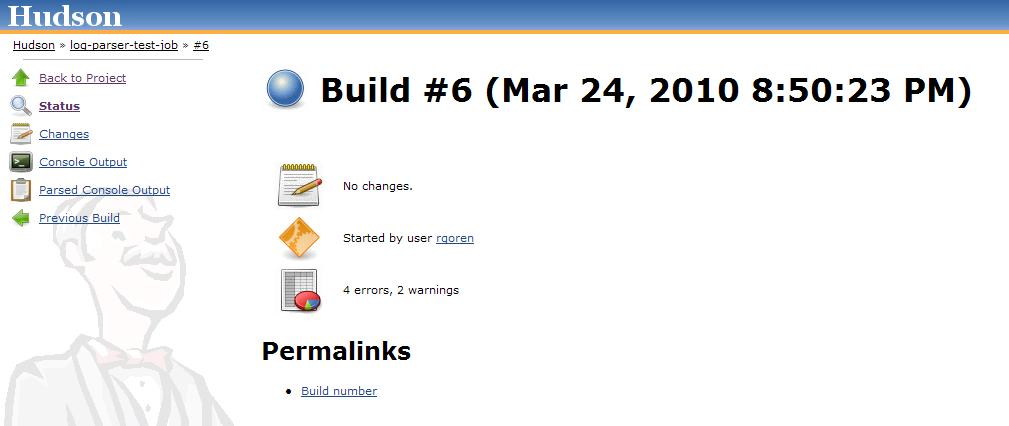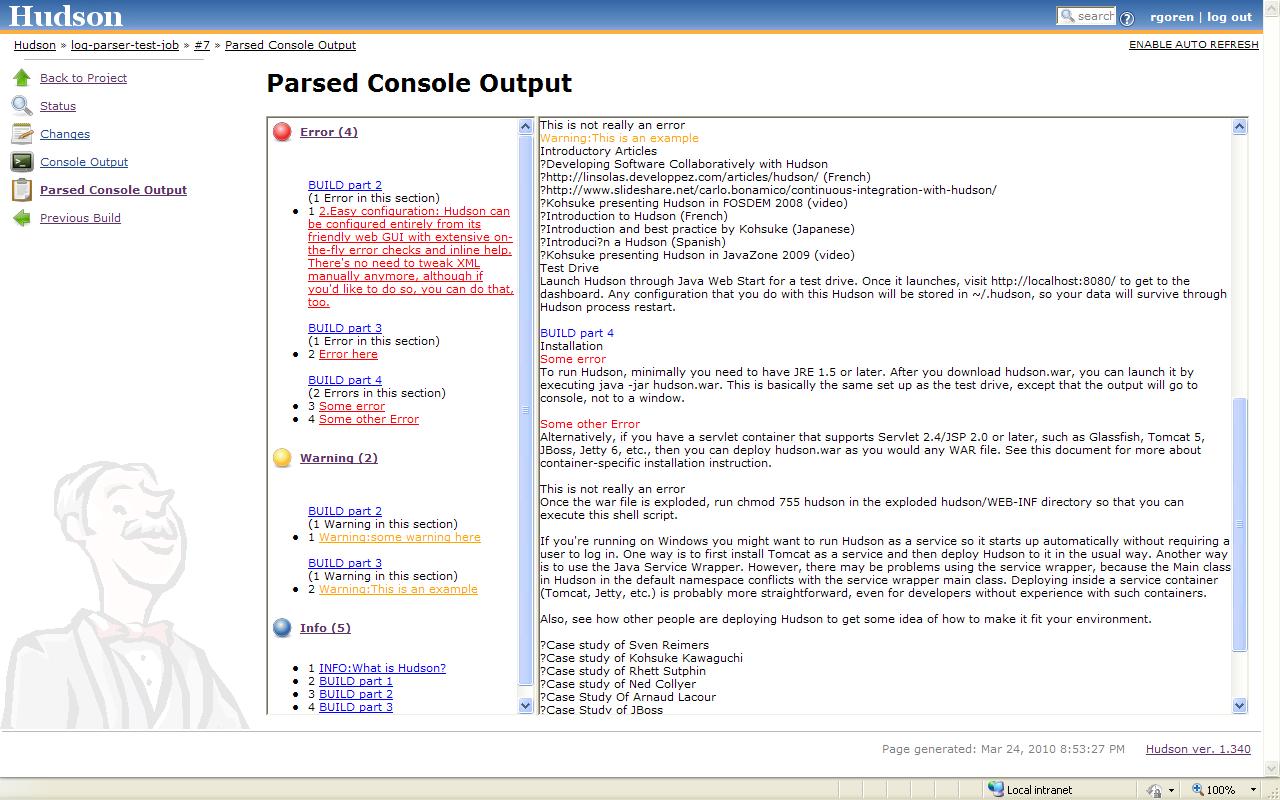Plugin Information |
|---|
View Log Parser on the plugin site for more information. |
Older versions of this plugin may not be safe to use. Please review the following warnings before using an older version:
Parse the console output and highlight error/warning/info lines.
Description
The log-parser plugin parses the console log generated by the Jenkins build. Parsing the console log allows for the following features:
- highlighting lines of interest in the log (errors, warnings, information)
- dividing the log into sections
- displaying a summary of number of errors , warnings and information lines within the log and its sections.
- linking the summary of errors and warnings into the context of the full log, making it easy to find a line of interest in the log
- showing a summary of errors and warnings on the build page
Parsed log example
Summary at build level
This shows a summary of errors and warnings on the build page
The parsed log
This is an example of a parsed log of a build.
It is accessible from the "Parsed Console Output" link on the left side of the build page :
The left side of the report can be expanded to browse the errors/warning/info lines. These lines are links to the full log on the right, where they can be easily located. Clicking on a certain error will bring you right to it on the full log which appears on the right side of the screen. The log is also divided into logical sections (as defined in the parsing rules configuration described below). In the summary section on the left you can see the errors/warnings as they appear in the log sections. This can help understand in what part of the build there is an error/warning. Both summary and log sections are scrollable and expandable.
Configuration
Several parsing options are configured at the global level.
Global Configuration
Parsing rules options
Appears in the global Jenkins configs as section "Console Output Parsing"
Configure pairs of logical names (project, description, etc.) and parsing rule files.
Later on, when a job is configured for log parsing, you will be able to choose one of these configurations to implement as the parsing rules for that job. (See "Job Configuration")
For each parsing rules option, specify :
Parsing rule name - logical name which will be displayed in the job level configuration as an option
Parsing Rules File - A file with the parsing rules implemented in this option. (See "Parsing rules files" to learn more about the syntax of these files.)
Parsing rules files
Format
Each line in the file specifies a level (ok/error/warn/info/start) and a regular expression (based on java.util.regex.Pattern) delimited by slashes ("/") to look for in order to mark the line as matching that level.
- ok/error/warn
Used to identify problem lines.
- info
These lines are highlighted blue in the report. They are used to create a set of links into the report for quick access to certain sections.
- start
Like info lines, they are highlighted blue in the report, and appear in the set of quick access links to the report. In addition, they are used for grouping the list of errors and warnings found in that section.
For example, the following line in the parsing rules file means that a line including the word "ERROR" will be marked as an error line:
error /ERROR/
- Case insensitive matches
The notation supports the Java regex embedded flag expression. To perform a case-insensitive match, use (?i) notation.
Example: to match lines starting with the case-insensitive word 'error', use:error /(?i)^error /
- If a line matches several rules, the first one applies.
So for the following set of rules :And the following line in the build log:ok /^javadoc:/ error /Error/
The line will be considered "ok", and will not be highlighted as an error, since thejavadoc: Error : could not find something
^javadoc:pattern is matched first.
- Lines starting with a '#' character, and blank lines will be ignored to allow comments and spacing.
Example parsing rules file:
ok /not really/ # match line starting with 'error ', case-insensitive error /(?i)^error / # list of warnings here... warning /[Ww]arning/ warning /WARNING/ # create a quick access link to lines in the report containing 'INFO' info /INFO/ # each line containing 'BUILD' represents the start of a section for grouping errors and warnings found after the line. # also creates a quick access link. start /BUILD/
Job Configuration
- Go to menu: Jenkins -> job name -> Configure
- Go to section : Post-build Actions
- Check the "Console output (build log) parsing" checkbox.
- "Mark build Unstable on Warning" option: check to have parsed warnings mark the build 'unstable'.
- "Mark build Failed on Error" option : check to have parsed errors mark the build 'failed'.
- "Select Parsing Rules" : select the set of rules to use for parsing the logs of this job's builds
(Notice that this list is derived from the global configuration )
Changelog
Version 2.0 (October 20, 2015)
- [JENKINS-29308] Update project configuration. Clean up.
- [JENKINS-27208] Make Log Parser Plugin compatible with Workflow.
Version 1.0.8 (December 14, 2010)
- Bug fix: Strip encoded ConsoleNote from log prior to parsing and display (JENKINS-7263).
- Enhancement: Allow marking builds with warnings as unstable (JENKINS-7853).
- Bug fix: Links to style sheets should be relative to Hudson root url (JENKINS-8268).
Useful parse lines
This section collects some useful additional parse-statements contributed by users of the Log Parser Plugin
JaCoCo code coverage fails to read class-data
error /Execution data for class .* does not match./




